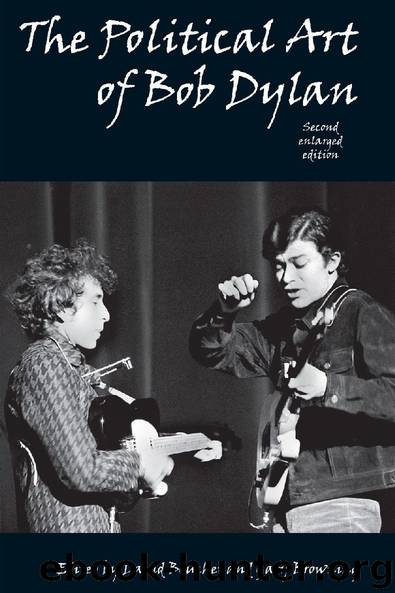The Political Art of Bob Dylan by David Boucher & Gary Browning

Author:David Boucher & Gary Browning
Language: eng
Format: epub
Tags: Bob Dylan, popular culture, pop culture, political art, alienation, protest, non-conformity, American Dream, modernity, postmodernism, modernism, politics, literary criticism, aesthetics, aesthetic theory, Kant, Adorno, Lyotard, Lorca, Collingwood, humanity, expressionism, Live Aid, cosmopolitanism, freedom, music, biography
ISBN: 9781845406523
Publisher: Andrews UK Limited 2017
Published: 2017-05-15T00:00:00+00:00
Bob Dylan, Live Aid, and the Politics of Popular Cosmopolitanism, Chris Brown
[1]
Introduction
I hope that some of the money that’s raised for the people in Africa, maybe they could just take a little bit of it - maybe one or two million, maybe - and use it, say, to pay the ... er ... the mortgages on some of the farms ... the farmers here, owe to the banks. (Bob Dylan at the Live Aid Concert in RFK Stadium, NYC. 13 July 1985 (Sounes 2001: 367).
At least that’s probably what he said - this section of the concert was dropped from the subsequent Videos/DVDs and can only be seen on YouTube, a reflection of the abysmal nature of Dylan’s performance on the day as well as the perceived political incorrectness of his comment. The one Dylan number that can still be watched on DVD - a performance of ‘Blowin’ in the Wind’ with Keith Richard and Ron Wood - is ample evidence that all three of the performers were very much the worse for wear. But two things about Dylan’s rambling statement are clear; first, this was a stimulus for the formation of Farm Aid which was, and is, designed to help American farmers, and second that Bob Geldof was furious with Dylan for going off message.
He displayed a complete lack of understanding of the issues raised by Live Aid ... Live Aid was about people losing their lives. There is a radical difference between losing your livelihood and losing your life. It did instigate Farm Aid, which was a good thing in itself, but it was a crass, stupid, and nationalistic thing to say (Geldof 1986). [2]
The aim of this essay is to examine, and challenge, that final characterization; Dylan’s comment may have been, in one sense, nationalistic, but it was neither crass nor stupid - rather, it can be taken to shed light on important debates in contemporary (international) political theory. To summarise what I hope to demonstrate at greater length below, what I take Dylan to be saying here is not that charity ought to begin and end at home, but that charity which does not begin at home ought not to be taken seriously - there is nothing in Dylan’s comments that is designed to undermine a concern for the needs and interests of ‘distant strangers’; rather, the import is that our concern for distant strangers ought not to displace our concern for those closer to home. Indeed we have greater obligations towards our fellow citizens than towards strangers, and the juxtaposition of ‘loss of livelihood’ and ‘loss of life’ leads to more complicated reflections than Geldof is prepared to allow.
The second half of this essay will address these portentous themes, but the first half will take the form of an exercise in Dylanology. Why did Dylan say what he did, when he did? Was his statement simply a reflection of ‘Right Wing Bob’ to quote the title of a hostile website, or of a general crankiness
Download
This site does not store any files on its server. We only index and link to content provided by other sites. Please contact the content providers to delete copyright contents if any and email us, we'll remove relevant links or contents immediately.
The Goal (Off-Campus #4) by Elle Kennedy(13674)
Kathy Andrews Collection by Kathy Andrews(11834)
Diary of a Player by Brad Paisley(7581)
Assassin’s Fate by Robin Hobb(6218)
What Does This Button Do? by Bruce Dickinson(6207)
Big Little Lies by Liane Moriarty(5804)
Altered Sensations by David Pantalony(5104)
Pale Blue Dot by Carl Sagan(5008)
Sticky Fingers by Joe Hagan(4199)
The Death of the Heart by Elizabeth Bowen(3622)
The Heroin Diaries by Nikki Sixx(3550)
Confessions of a Video Vixen by Karrine Steffans(3309)
Beneath These Shadows by Meghan March(3308)
How Music Works by David Byrne(3270)
The Help by Kathryn Stockett(3147)
Jam by Jam (epub)(3093)
Harry Potter 4 - Harry Potter and The Goblet of Fire by J.K.Rowling(3074)
Computational Linguistics and Intelligent Text Processing: 20th International Conference, CICLing 2019 La Rochelle, France, April 7â13, 2019 Revised Selected Papers, Part I by Alexander Gelbukh(2995)
Strange Fascination: David Bowie: The Definitive Story by David Buckley(2872)
